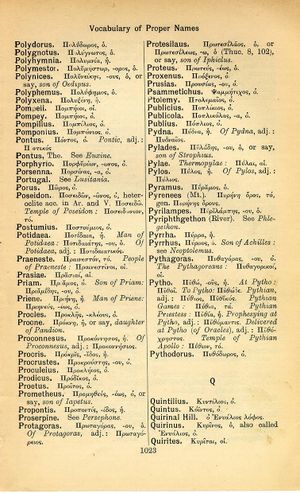Prodicus
Ὁ δὲ μὴ δυνάμενος κοινωνεῖν ἢ μηδὲν δεόμενος δι' αὐτάρκειαν οὐθὲν μέρος πόλεως, ὥστε ἢ θηρίον ἢ θεός → Whoever is incapable of associating, or has no need to because of self-sufficiency, is no part of a state; so he is either a beast or a god
English > Greek (Woodhouse)
Πρόδικος, ὁ.
Latin > English (Lewis & Short)
Prŏdĭcus: i, m., = Πρόδικος,
I a Grecian sophist of Ceos, contemporary with Socrates, author of the story of The Choice of Hercules, Cic. Brut. 8, 30; id. de Or. 3, 32, 128; Quint. 3, 1, 12.—Hence,
II Prŏdĭcĭus, a, um, adj., of or belonging to Prodicus: Prodicius Hercules, Cic. Off. 1, 32, 118.
Latin > French (Gaffiot 2016)
Prŏdĭcus,¹⁶ ī, m. (Πρόδικος), philosophe de l’île de Cos : Cic. Nat. 1, 118 || disciple d’Hippocrate : Plin. 29, 4 || -cĭus, a, um, de Prodicus : Cic. Off. 1, 118.
Latin > German (Georges)
Prodicus, ī, m., ein griech. Sophist aus Keos, Zeitgenosse des Sokrates, der für den Erfinder der bekannten Erzählung von Herkules am Scheidewege gehalten wird, Cic. Brut. 30; de nat. deor. 1, 118. Quint. 3, 1, 12. Min. Fel. 21, 2.

